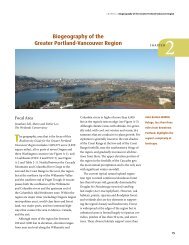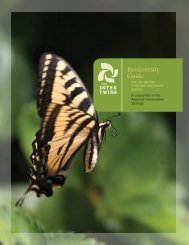Biodiversity Guide - The Intertwine
Biodiversity Guide - The Intertwine
Biodiversity Guide - The Intertwine
You also want an ePaper? Increase the reach of your titles
YUMPU automatically turns print PDFs into web optimized ePapers that Google loves.
Chapter 6 Important Issues and ConceptsImportant Issues and ConceptsChapter6Protecting wildlife habitats and vegetationcommunities is key in establishing and maintainingan ecologically robust and healthy interconnectedsystem of natural areas and, in turn,protecting regional biodiversity, air and waterquality, and other ecosystem services. Althoughplant communities and wildlife habitat are visibleand tangible units, they are in turn affected by avariety of external processes and functions. Whenprioritizing conservation actions and identifyingdesired future conditions, it is important toconsider the role that climate, fire, hydrology,pollination, anchor habitats, and habitat connectivityplay in achieving conservation goals forecosystems, watersheds, and the entire greaterPortland-Vancouver region.Climate Change 1Mike Houck, Urban Greenspaces Institute andKaitlin Lovell, City of PortlandClimate change will affect all aspects of conservationwithin the greater Portland-Vancouverregion. That climate change already is occurringhas been well documented. Over the last century,the Pacific Northwest has seen an increase inaverage temperature (by 1.5 degrees Fahrenheit),the loss of snowpack in the Cascades, and shiftsin the timing and volume of stream flows. Projectedchanges to aquatic systems include changesin hydrology, water supply, and stream flows;reduced water quality; degradation of wetlandecosystems; and an increase in breeding groundsfor waterborne diseases. <strong>The</strong> region can expect tohave reduced air quality, along with higher averageannual air temperatures and more frequentextreme heat events.Current models predict that the region’sterrestrial resources also will experience negativeeffects from climate change; these effects includeincreased incidents of short-term drought,increases in the frequency and intensity ofwildfires, and more frequent landslides. <strong>The</strong>re arelikely to be shifts in the quantity and quality offish and wildlife habitat and refugia for sensitivespecies. Generally, specialist species and speciesthat require specific habitats or ecosystem processesmay be more adversely affected by climatechange than generalist species. It is likely that certainspecies’ ranges will be further constricted, or1 This discussion is excerpted from a more in-depth piece written for the Regional Conservation Strategy (Chapter 5).107




